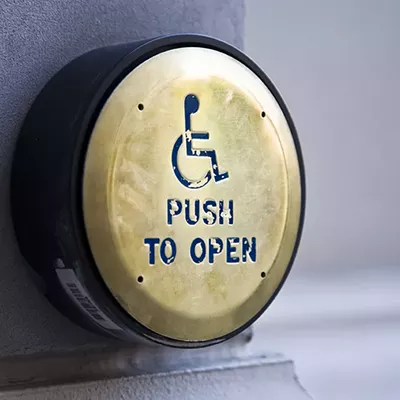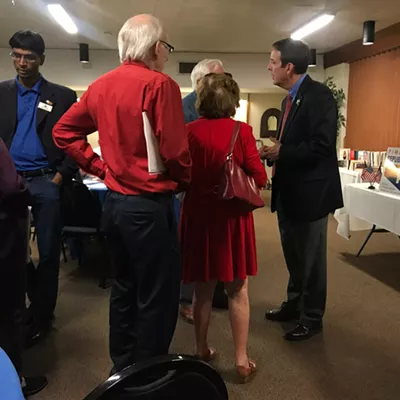Political consultant Byron Howard is about as conservative as you can get without crossing the party line--which he himself did last year, quietly supporting Republican Bob Walkup against Democrat Molly McKasson in the mayor's race.
His opponent, John Crouch, didn't even join the party until 1997, when he registered as a Democrat to support City Councilman Jerry Anderson in the primary. "The major parties have fallen behind the curve in terms of social change," says Crouch, who counts among his accomplishments a spot on the guest list for a New Year's Eve Grateful Dead show. "I was never involved with those kinds of standard political organizations. I have a history of political activism and educational activism. I always kind of viewed myself as a change agent."
Crouch first came to Arizona in 1973. He spent a year and a half driving a school bus before landing a job at the local PBS affiliate, KUAT-TV. On the side, he launched his own video production company specializing in Native American documentaries. (He's a member of the Cherokee tribe himself.) The video work has earned him numerous honors and grants.
In recent years, Crouch has worked as the multimedia magnet program coordinator at Pueblo High, developing a program that has students working on radio and television production and web page design.
Crouch was weighing a run for state Senate in District 12, but after hearing Howard speak at a political event, he decided he would rather challenge him in the board race.
"(Howard) began his speech, 'I'm 55 years old,' and outlined his views for the county," Crouch remembers. "I was going to talk on Senate issues, but I was so taken aback by what he said that I had to stand up and say, 'I'm 55 years old but two generations younger and I don't know how that works.' "
Howard, who is actually 54 years old, has certainly followed a far different political trajectory than Crouch. In the 1970s, he worked for Pima County Wastewater Management, including a three-year stint as director. He left the county in 1979 to work as an executive in the homebuilding industry. In 1989, he took the reins of the Tucson Business Coalition, a group of small businesses that influenced politics in the early 1990s. After the organization withered, Howard created his own political consulting business. His biggest client these days is the Town of Marana, although he has also done work for other organizations, including the Southern Arizona Home Builders Association and the local subcontractors union, the Alliance of Construction Trades.
"Quite frankly, I have as much to offer as anybody who's running," says Howard, who promises to work toward compromise among Pima County's polarized political camps. He's assembled a solid campaign machine, tapping centrist Democrats like Steve Emerine, Judy Abrams and County Recorder F. Ann Rodriguez, who is also Howard's fiancée. He's also got the support of Republican Patti Noland, a former state senator who is now serving as clerk of Superior Court. He'd raised $44,520 as of May 31, with more than $20,000 coming from builders, brokers, bankers and other players in the development industry.
Crouch, meanwhile, got his campaign off to a late start. He hadn't even begun raising money before May 31, the deadline for the last campaign finance report.
The two candidates split most sharply on land-use policy. Crouch takes a hard line, supporting the Citizens Growth Management Initiative and calling for steep development impact fees.
"I think it's time for the development community to pay full cost for these projects," Crouch says. "We can't place that tax burden on the citizens. The role of government is to facilitate answers that don't place further burdens on their citizens in terms of taxes or anything else."
Crouch says impact fees don't necessarily have to be paid in cold, hard cash. He suggests developers could offer to lease spaces in shopping centers at a discount rate.
"If that developer is going to put that strip mall along La Cholla, then let's talk to that developer about mitigating to the community by subsidizing one of those small areas in that mall for a local family small business."
Crouch says it's important for the community to nurture small businesses. "If a man works for a franchise for 25 years, he leaves with a 401K, depending on how he's managed. If you have a small family-owned business, then when the family shuts the business down, the family has the inventory, which becomes the inheritance that's passed on. You don't want people working for national franchises. We'll have those, but instead of having a Walgreen's on every fourth corner in our city, we would be better served to have family businesses spread through our city."
Howard says he supports impact fees "based on facts, not this gunslinging approach" that he suggests the county has used in the past. Despite the fact that county staff worked extensively to devise a formula that could hold up in court, Howard says transportation impact fees weren't carefully considered. He sees impact fees as part of an expanded planning process. While he agrees with the aims of the county's ambitious Sonoran Desert Conservation Plan, he says it doesn't go far enough.
"It doesn't identify all the land that needs to be undevelopable," Howard says. "In other words, protected regardless of who's doing it, the Sonoran Desert plan or the pygmy owl or the state or the federal or anybody else. But number two, just as important, if it infringes on land that is privately held, go to the owners, tell them this is what our plan is, purchase it. Don't play games with them."
Crouch also supports the Sonoran Desert Conservation Plan. "If we don't make decisions today about protection of our open spaces, protection of the wildlife corridors, protection of our species and protection of our business, you're not in any position to make decisions in 10 years," he says. "Unless you protect today, you can't decide to further protect in 10 years."
Crouch supports the board's recent efforts to downzone property (For details, see "Beating Raúl," page 10). "Zoning decisions made in 1959 may not be appropriate zoning decisions for today," he says. "Just because the man has the zoning right does not mean that development is in the best interest of Tucson and the rest of the community. I'm not sure that you reimburse people on future speculation and profits."
Howard has the opposite view. "I don't support the shenanigans they played with the McLoughlin property (at Gates Pass and North Camino de Oeste)," Howard says. "I agree it doesn't belong in that intensity. But if I were on the board, I would not be party to the playing of games at taxpayer expense. And that's really what they're doing. They're trying to have the taxpayer pay for trying to find out if you have a right to downzone."
That's a right Howard doesn't believe the board should have. "You are taking someone's rights away," he says. "And it's a bad decision to take someone's rights away. Now there are zonings that are subject to standard and special conditions. Byron doesn't consider that hard zoning."
Both candidates support keeping Kino Hospital open and both say the county needs to get its finances in order. Crouch hopes for more money from the development community through impact fees and more volunteer citizen involvement to provide services.
Howard says the county needs to find new sources of revenue. He promises to lobby the legislature for more funds and, if that doesn't work, he'd like to file suit against the state.
"I don't want our legislators or our business community going up there and saying, 'Hey we'll trade this off,' maybe get a little better deal," Howard says. "I'm tired of that crap. They've stolen maybe $100 million from us because of the formula, and the formula will never get any better."
He also supports enacting a general half-cent sales tax, which requires a unanimous vote of the board of supervisors. District 4 Supervisor Ray Carroll has been the lone holdout on the tax, but Howard thinks he can persuade him to change his mind.
Howard doesn't believe the county budget can be cut. "I could see some of the priorities changing, but reduction? No. I don't think we can meet the demand of services if we stay where we are today."









